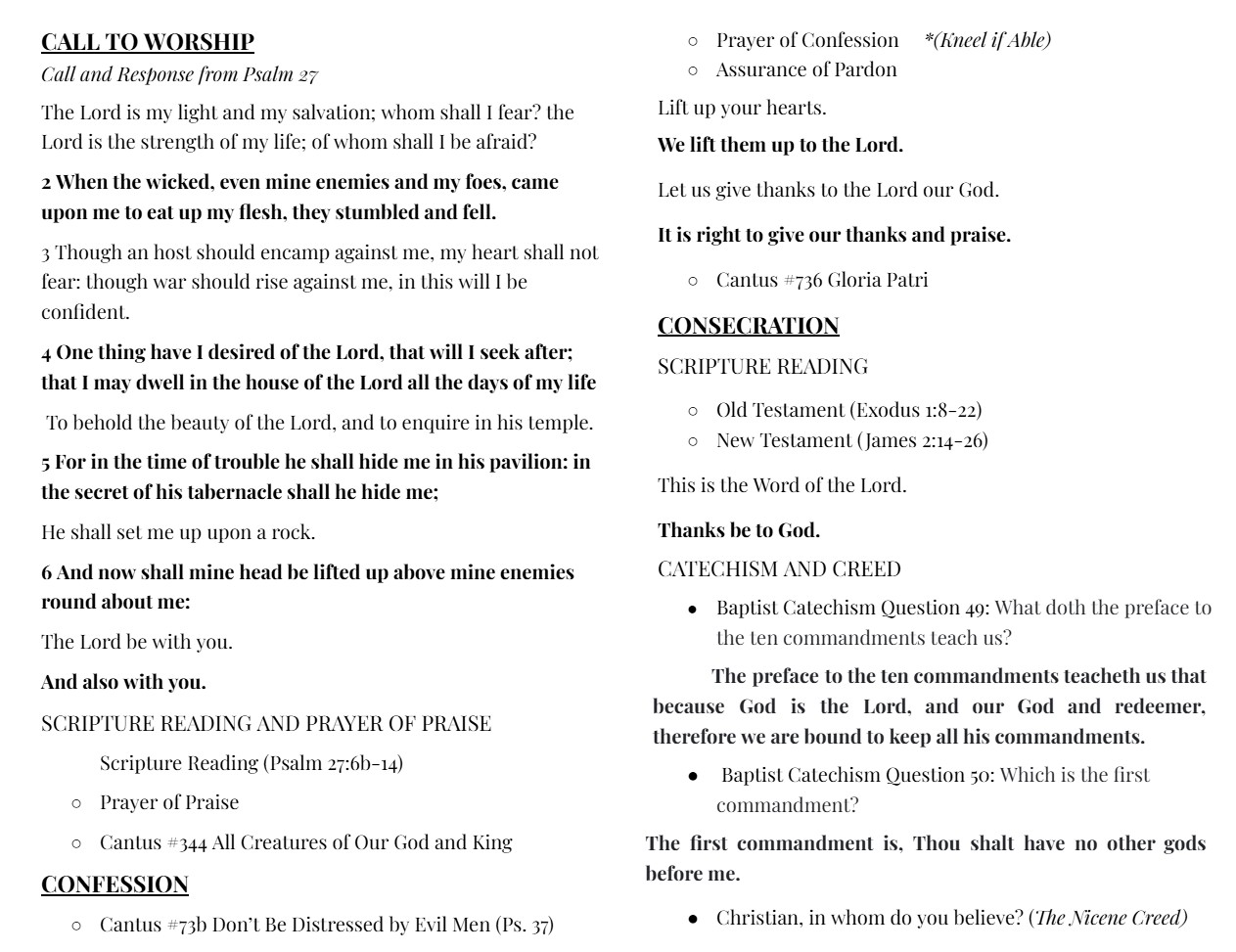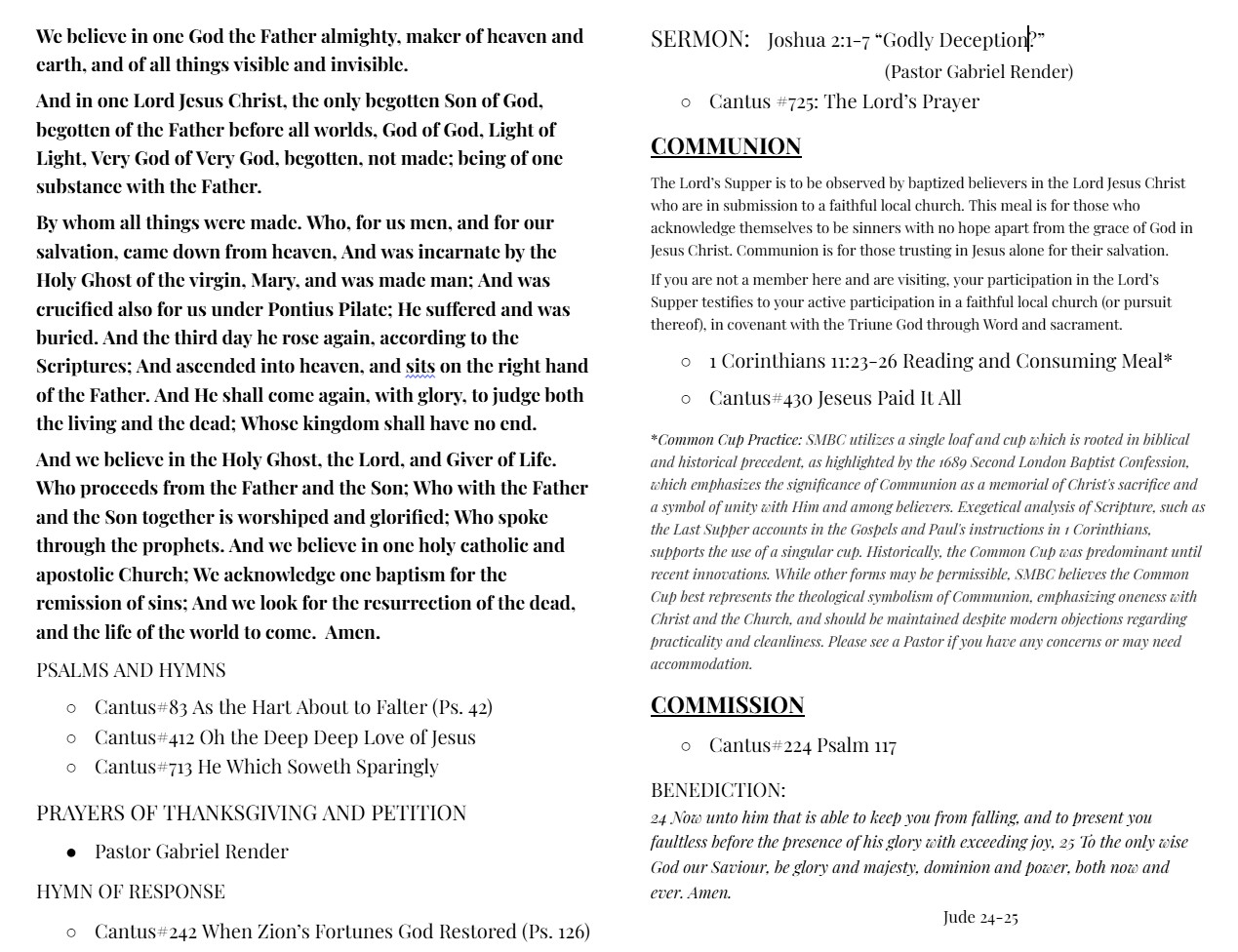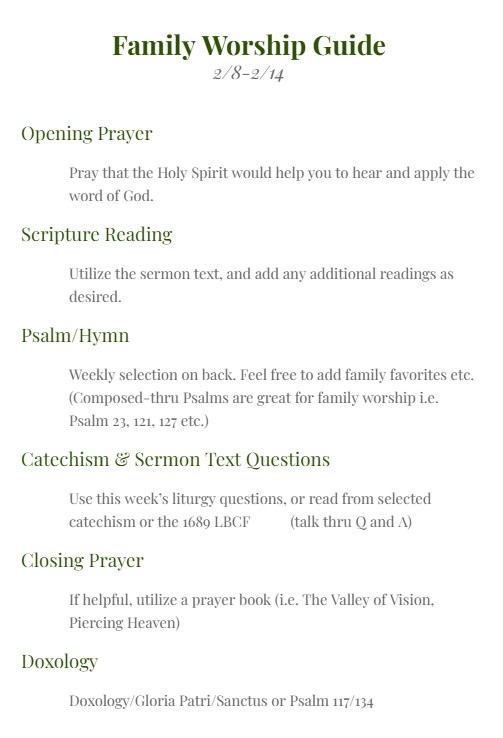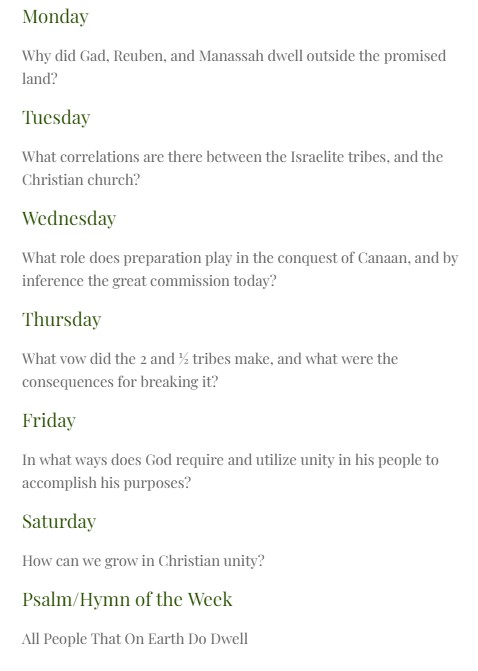Statement on Covenant Remembrance Liturgy Worship
Our worship is to be founded on the Scriptures. We do not worship according to our own desires or opinions but according to God’s Word (Exodus 20:4-6; Deuteronomy 12:32). God’s Word sets a consistent pattern for the worship of His people, founded in the Old Testament sacrificial system. This sacrificial system was fulfilled in the once-for-all sacrifice of Jesus Christ (Hebrews 10:1-14) for the sins of all His people. Still, these sacrifices in the Old Testament, these types and shadows which were fulfilled in Christ, inform us on what proper worship to God entails. The basic outline of these sacrifices is seen in Leviticus 9, and they include the guilt (or sin) offering, the burnt (or ascension) offering, and the peace offering.
Throughout the Old Testament, when these three sacrifices are mentioned together, they occur in this exact order, and they were always a part of God’s people renewing covenant with God. God prescribed a particular order for these sacrifices because this is the proper way for us to go about our worship of God. The New Testament continues to speak of our worship in terms of sacrifice.
15 By him therefore let us offer the sacrifice of praise to God continually, that is, the fruit of our lips giving thanks to his name. -Hebrews 13:15
1 I beseech you therefore, brethren, by the mercies of God, that ye present your bodies a living sacrifice, holy, acceptable unto God, which is your reasonable service. -Romans 12:1
Though we no longer offer up physical sacrifices in worship because of the perfect substitutionary sacrifice of Jesus Christ in the place of His people, there is still a sense in which New Testament worship is to be a type of sacrifice, a type of covenant reminder, which culminates in the Lord’s Supper, renewing covenant with God and with one another in the church.
And so, we come to God each week to worship Him through a service which is a form of covenant remembrance. We do not come to renew covenant with God because our covenant with Him requires constant reaffirmations and renewals to remain in effect. The new covenant in Christ is an eternal covenant that will never pass away. Rather we reaffirm our covenant with God because we have and we desire a living and abiding relationship with God, and this requires that we come before Him in worship consistently in order to foster that living relationship.
We begin our worship with the call to worship, the start of the service. In this, we recognize that it is God who calls us to worship. Our worship to God is a response of His gracious calling. If it was not for God’s gracious calling to each of His people, we would have no right or ability to come before God in worship.
As we come into His presence, we are immediately aware of our sins, or many failures to obey God’s law, and therefore the fact that we must confess and receive forgiveness for our sins before we are to have right fellowship with God. This element of the worship service corresponds with the guilt offering of the Old Testament covenant renewal service. The people of God confess their sins as a people, and they receive an assurance of pardon in light of the finished work of Christ in their place.
We confess our personal sins and together pray a corporate prayer of confession while kneeling. We do this because the Scriptures speak of coming before the Lord on our knees (Psalm 95:6) and speak of this posture as one of humility (2 Chronicles 6:13, Psalm 138:2, Daniel 6:10). As embodied creatures, we believe that bodily posture is an important aspect of our worship. As we stand for the reading of the word of God (Nehemiah 8:5, Luke 4:16), and lift our hands as we sing the song of commissioning at the end of the service (Psalm 134:2), so we kneel in humble confession of our sins.
After receiving the assurance of pardon in light of our confession of sin, we then consecrate ourselves wholly to God in our worship, as we are commanded to do in Romans 12:1. This corresponds to the burnt (or ascension) offering of the Old Covenant. Our worship is to ascend to God as a pleasing aroma to Him, and we are to offer our entire selves in that worship as we ascend to the heavenly Mount Zion (Hebrews 12:22-24).
We are consecrated to God as we are renewed in the word of God, and so this is the portion of our worship service in which we read the word of God, hear the preaching of God’s word, and offer our prayers of thanksgiving and supplication. The consecration portion of the service also contains the bulk of our singing, though this permeates every aspect of our worship.
Following the ascension offering is the peace offering, which was a type and shadow of the Lord’s Supper in the New Testament in light of the command and example of Christ with His disciples. The peace offering was a meal in which the people of God would eat in the presence of God. This meal was to come in light of the sacrifices which had come before it. God’s people first confess their sins and receive pardon, then consecrate themselves wholly to God, and then commune with God in a fellowship meal.
The Lord’s Supper is a meal in the presence of God which, like the peace offering, communicates to the believer that they have God’s gracious favor. Communion is a sign of the believer’s abiding fellowship with God through Jesus Christ. The Lord’s Supper is a testimony and memorial to the fact that we are one with God and with one another in the church through our Head Jesus Christ. Each Lord’s Day service therefore culminates with the people of God sharing a meal, table fellowship, with God. This begins our feasting in fellowship as each Lord's Day service is followed by a shared meal in the home of one of our members.
Following Communion, the people of God are commissioned by God to be sent out into the world with a benediction. The service ends with a recognition that we are those to whom God has given the message of reconciliation, and so we are sent out not to keep this good news to ourselves but to spread the message of Christ to the world. We leave the assembly of God’s people with the recognition that God promises to be with us and to sustain us in our work throughout the week, to His glory.
COME WORSHIP WITH US THIS LORD'S DAY
Sunday Morning
SERVICE
10:00am
American Legion Hall
1504 2nd St S, Nampa, ID 83651




